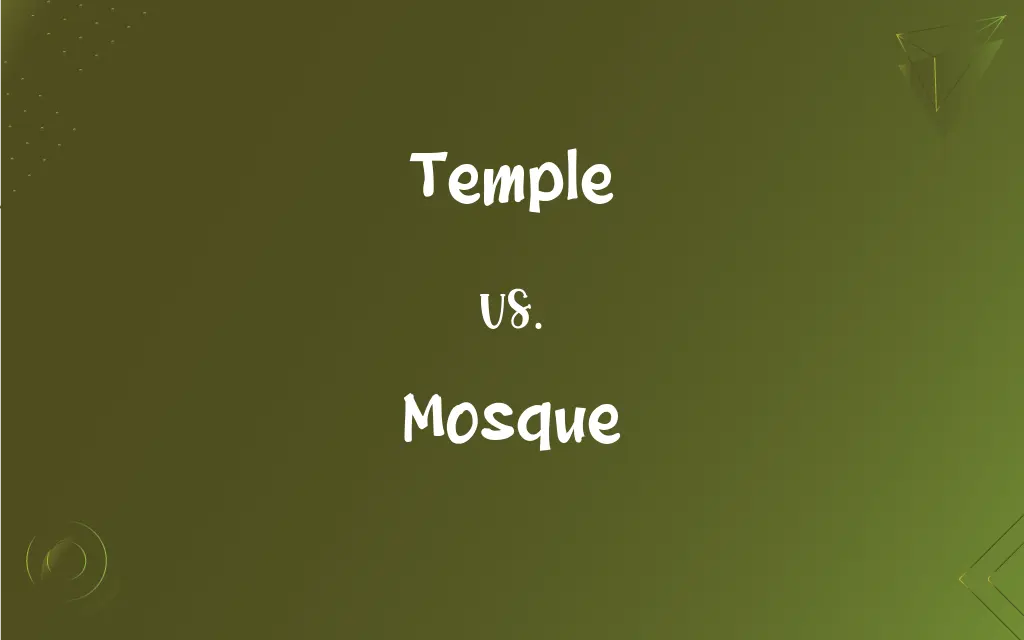Temple vs. Mosque: What's the Difference?
Edited by Aimie Carlson || By Harlon Moss || Published on November 24, 2024
A temple is a place of worship for various religions; a mosque is a place of worship specifically in Islam.

Key Differences
Temples serve as places of worship and spiritual activities for multiple religions, including Hinduism, Buddhism, and Judaism, among others. They are sacred sites where followers perform rituals, offer prayers, and participate in religious ceremonies. Temples often embody significant architectural designs reflecting the cultural and religious ethos of the community they serve. Mosques, on the other hand, are Islamic places of worship where Muslims perform their five daily prayers. Central to the mosque's function is the communal Friday prayer, known as Jumu'ah, which brings the community together in a collective act of worship. Unlike temples, which may have images or idols for worship, mosques are characterized by their aniconic environment, focusing on the unity of God in Islam.
The role of temples extends beyond the religious to encompass educational and social aspects within the community. Many temples host festivals and celebrations that are significant to their religion's calendar, making them centers of joy, education, and cultural preservation. In contrast, mosques play a vital role in the social fabric of the Muslim community, offering spaces for learning, community gatherings, and even charitable activities. The mosque serves as a hub for Islamic education, where teachings of the Quran and Hadith are imparted. It also plays a critical role during the month of Ramadan, serving as a place for the Taraweeh prayers and facilitating the breaking of fasts, thereby fostering a strong sense of community and brotherhood among its members.
Both temples and mosques signify the diversity of worship practices and the architectural grandeur that religious devotion has inspired across cultures and epochs. While temples may vary widely in their design, reflecting the diverse traditions they represent, mosques share a common architectural language that unites Muslim communities globally. Despite these differences, both temples and mosques serve as places of refuge, prayer, and community, playing pivotal roles in the spiritual and social lives of their respective followers.
Comparison Chart
Primary Use
Place of worship for various religions.
Islamic place of worship for daily prayers.
Architectural Features
Often features images or idols.
Aniconic, with minarets, mihrab, and qibla.
ADVERTISEMENT
Religious Role
Centers for rituals, ceremonies, and festivals.
Focuses on communal prayers, especially Jumu'ah.
Social Function
May serve as cultural and educational centers.
Acts as a community hub for education and charity.
Worship Practices
Practices vary widely across religions.
Uniform practices focusing on the unity of God.
Temple and Mosque Definitions
Temple
A structure that houses deities or idols for worship.
Devotees gather at the temple to offer prayers to their deity.
Mosque
A place of worship for Muslims, characterized by its unique architectural elements.
The mosque's minaret can be seen from miles away, calling the faithful to prayer.
ADVERTISEMENT
Temple
A place for practicing and teaching the beliefs of a particular religion.
The temple also serves as a school for religious education.
Mosque
A community gathering place for Islamic prayers, especially the Friday Jumu'ah.
The community gathers at the mosque every Friday for the Jumu'ah prayer.
Temple
A site for performing rituals and ceremonies.
The temple is renowned for its elaborate yearly ceremony.
Mosque
A center for Islamic learning and religious education.
Children attend classes at the mosque to learn about the Quran.
Temple
A cultural landmark that embodies the architectural heritage of a religion.
The temple's architecture draws visitors from around the world.
Mosque
A symbol of Islamic faith and unity, featuring a qibla wall facing Mecca.
Inside the mosque, the qibla wall indicates the direction of Mecca for prayer.
Temple
A building dedicated to religious worship or activities.
The ancient temple stands as a testament to the city's historical significance.
Mosque
A building that serves social and charitable purposes within the Muslim community.
The mosque organizes a food drive for the needy during Ramadan.
Temple
A building dedicated to religious ceremonies or worship.
Mosque
A building used as a place of Muslim worship.
Temple
Temple Either of two successive buildings in ancient Jerusalem serving as the primary center for Jewish worship.
Mosque
(Islam) A place of worship for Muslims, often having at least one minaret; a masjid.
There's a mosque near where I live.
Mosque
A Mohammedan church or place of religious worship.
Mosque
(Islam) a Muslim place of worship
FAQs
Are non-Muslims allowed to enter mosques?
Many mosques welcome non-Muslim visitors outside prayer times, but it's best to check specific guidelines.
What activities take place in a temple?
Rituals, ceremonies, religious festivals, and educational activities are common in temples.
Can anyone visit a temple?
While most temples welcome visitors, some may have restrictions based on religious customs.
What defines a temple?
A temple is a place of worship for various religions, often housing deities or idols.
How do temples and mosques differ in worship practices?
Temples cater to diverse rituals across religions, while mosques follow uniform Islamic practices.
How do mosques contribute to the community?
Mosques serve as centers for education, charity, and social gatherings within the Muslim community.
What architectural features are common in temples?
Temples may feature intricate designs, idols, and symbols relevant to their religious context.
What is unique about a mosque?
A mosque is a place of worship in Islam, known for its aniconic environment and specific architectural features.
What are the key architectural elements of a mosque?
Key elements include minarets, mihrab, qibla wall, and absence of images or idols.
Can temples be found in all religions?
Many but not all religions use temples; the concept varies widely across faiths.
Do temples have specific dress codes?
Some temples require modest dress or specific attire as a sign of respect.
What makes mosques central to Islamic life?
Mosques are central for prayer, community unity, and Islamic education.
Is there a dress code for entering a mosque?
Modest dress covering most of the body is required in mosques, for both men and women.
What role do mosques play during Ramadan?
Mosques are pivotal for Taraweeh prayers, community Iftars, and heightened charitable activities during Ramadan.
What is the significance of Friday prayers in a mosque?
Friday Jumu'ah prayers are a key communal worship event in Islam, emphasizing community and unity.
Do temples play a role in community education?
Yes, many temples offer religious and sometimes secular education to their communities.
How do temples impact cultural heritage?
Temples often preserve ancient art, architecture, and traditions, enriching cultural heritage.
What is the community significance of temples vs. mosques?
Both serve as community hubs, but temples often focus on cultural and religious diversity, while mosques emphasize Islamic unity and education.
Do all mosques face Mecca?
Yes, mosques feature a qibla wall indicating the direction of Mecca, which Muslims face during prayer.
Are there any global guidelines for temple architecture?
Temple architecture varies greatly, often reflecting the cultural and religious traditions of its community.
About Author
Written by
Harlon MossHarlon is a seasoned quality moderator and accomplished content writer for Difference Wiki. An alumnus of the prestigious University of California, he earned his degree in Computer Science. Leveraging his academic background, Harlon brings a meticulous and informed perspective to his work, ensuring content accuracy and excellence.
Edited by
Aimie CarlsonAimie Carlson, holding a master's degree in English literature, is a fervent English language enthusiast. She lends her writing talents to Difference Wiki, a prominent website that specializes in comparisons, offering readers insightful analyses that both captivate and inform.







































































